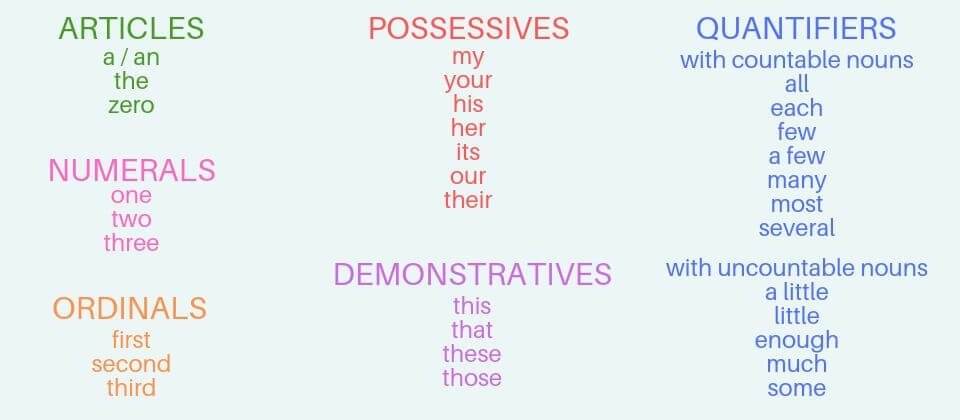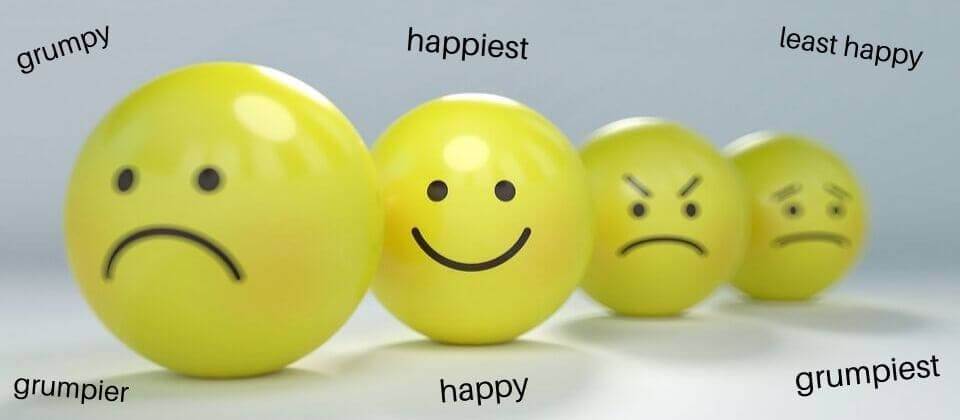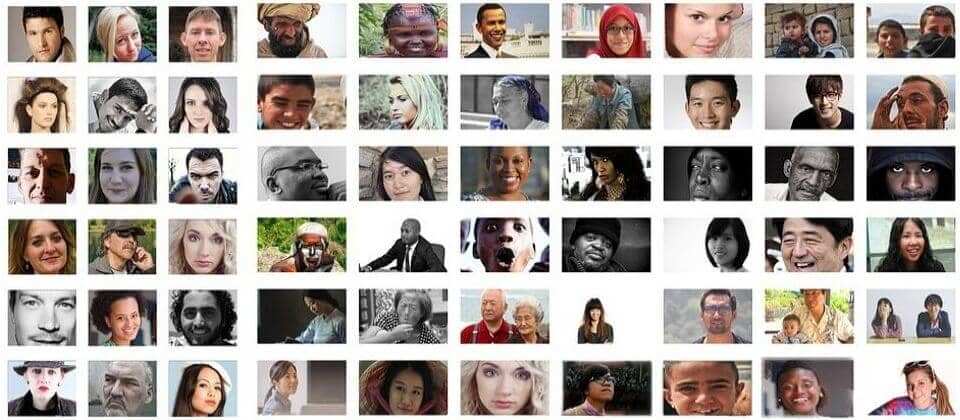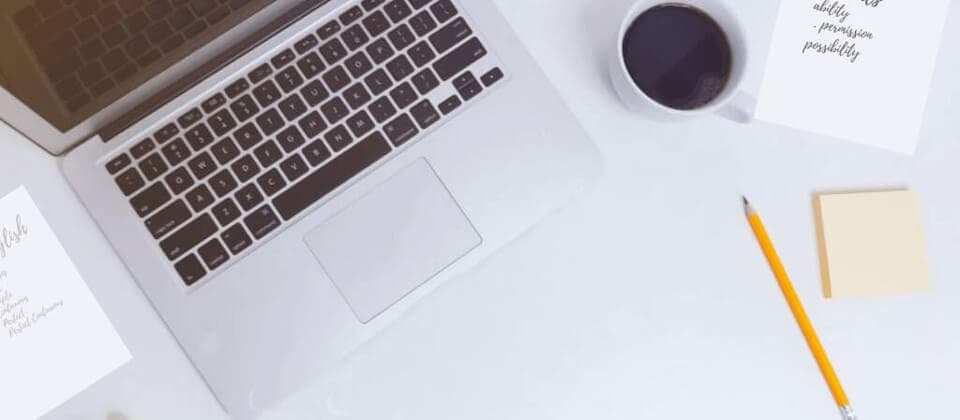Determiners Definition AND Types

Determiners introduce nouns and give more information about that noun. There are many forms of determiners in English, and here we’ll explore determiners definition and types.
Determiners are placed before a noun and they agree in number with the noun where more than one variant is available.
TYPES OF DETERMINERS
articles (a, an, the)
demonstrative determiners (this, that, these, those)
possessive determiners
quantifiers (numbers, some, all, each, every etc.)
ARTICLES
Articles are the most commonly used and best known determiners.
The 3 articles are:
indefinite article – a, an
definite article – the
zero article
INDEFINITE ARTICLE – a / an
Used for a singular noun.
They refer to a non-specific item of that type
a car – meaning any car, not a specific car
USES
a – is used before a noun beginning with a consonant sound
an – is used before a noun beginning with a vowel sound
NOTE: spelling is less important than the sound
an umbrella, a university, an MS–DOS program
when naming things
It’s a balloon.
with professions
I’m a teacher.
with the meaning of per
£10 an hour, £3 a kilo
when mentioning something for the first time
“I bought a book called Better English,” said Susan, “the book is very helpful.”
DEFINITE ARTICLE – the
Used with both singular and plural nouns.
It refers to a specific thing or things
the car, the cars
USES
when there is only one of something
the River Thames, the Earth
with superlatives
the best car
with certain adjectives
the first, the last, the nth
with certain fixed expressions
i.e. musical instruments
I play the piano
with countries:
whose names include a plural – the Philippines
whose names include a political term – the People’s Republic of China
More about countries and nationalities
ZERO ARTICLE
This is when we do not use an article or determiner. An article is not needed when:
the noun is plural and we’re making a generalisation
Cars are expensive to run.
with uncountable nouns
Water is essential to life.
with expressions of time
last week, next month
when another determiner is used
her car, that house
DEMONSTRATIVE DETERMINSERS
There are four demonstrative determiners, which are used to express whether the noun being discussed is nearby or further away:
this – used with a singular noun, when the noun is nearby
that – used with a singular noun, when the noun is further away
these – used with a plural noun, when the noun is nearby
those – used with a plural noun, when the noun is further away
nearby – generally means within touching distance, or within sight, or nearest of several, or nearest in a time line
further away – generally means out of line of sight or touch, or the furthest of several, or furthest in time line
Demonstratives may take the form of adjectives, and come before the noun.
I like this coffee shop. (when in or near the coffee shop)
She likes that coffee shop. (when the coffee shop is further away)
These shoes are my favourites.
Those boots are my least favourite.
Demonstratives may take the form of pronouns and stand instead of the noun.
This is not mine.
Those belong to Helen.
Demonstratives may be used to indicate that an action is in the present or past.
this and these are used with actions in the present
that and those are used with actions in the past
This is the best day of my life. (when speaking in the course of that day)
That was the best day of my life. (when the day in question is in the past)
These will be the best days of your life. (present)
Those were the good old days. (past)
More on Demonstrative Adjectives & Demonstrative Pronouns
POSSESSIVE DETERMINERS
Possessive determiners express ownership or possession of the noun they come before. They are also known as possessive adjectives.
my
your
his
her
its
our
their
whose – used mainly in the interrogative
Possessive determiners come before nouns or noun phrases
Here are your pencils.
This is my new house.
Whose jacket is this?
Note
Possessive determiners and possessive pronouns (mine, yours, his, hers, its, ours, theirs) are not the same. Possessive determiners are used with a noun, possessive pronouns replace the noun.
This is my house – possessive determiner, used with a noun
This is mine – possessive pronoun, used with no noun
More on Possessive Adjectives & Possessive Pronoun
QUANTIFIERS
Quantifiers are another form of determiners, and are used to express an amount or quantity of a noun.
The degree of the quantity can be expressed:
| Degree of Quantity | Quantifiers |
| complete, total quantity | all, whole |
| large, sufficient quantity | much, many, a lot, plenty of |
| sufficient for a purpose | enough |
| two | both, either, neither |
| a small quantity | few, a few, little, a little |
| unknown quantity | some, any |
| undetermined | each, every |
| zero quantity | not any, no |
USES
Some quantifiers are used with countable nouns, some with uncountable nouns and some with both:
| countable nouns | uncountable nouns | both |
| many | much | all |
| whole | little, a little | a lot of, lots of |
| few, a few | plenty of | |
| either | enough | |
| neither | some, any | |
| both | no/not any | |
| most |
all – refers to the total quantity of the noun
all / all the + plural countable noun
All mugs should be labelled with the owner’s name
All the shirts were dirty
all / all the + uncountable noun
In some countries, all water should be boiled before drinking.
all of + determiner + singular/plural noun
All of the apple had been eaten by the worm.
All of her suitcases were missing.
whole – a complete quantity
a / the + whole + singular noun
A whole street was being dug up.
The whole apple was rotten.
whole + plural noun
Whole streets were being dug up.
determiner + whole + singular noun
My whole day was a dream come true.
much – refers to a large quantity
with uncountable nouns
I haven’t got much money.
how + much + uncountable noun
creates interrogative
How much money is enough?
much of + article / possessive / demonstrative
Much of his money went to charity
too + much + uncountable noun
implies excess
There’s too much reliance on technology.
many – large quantity of individuals
with plural countable noun
There aren’t many boats in the harbour.
how + many + countable noun
creates interrogative
How many people were there?
many of + article / possessive / demonstrative
Many of the people left early.
too + many + plural noun
implies excess
Too many chefs spoil the broth.
a lot of / lots of /plenty of – a large, sufficient quantity
used with plural nouns
A lot of trees lose their leaves in winter.
There are plenty of fish in the ocean.
enough – the required amount
with plural countable or uncountable noun
Is there enough money in the account?
either – a choice between two options
either + singular noun
Either book will help you with your English homework.
either of the + plural noun
Either of the books will help you with your homework.
neither – in a choice between two options, meaning not one and not the other
neither + singular noun
Neither child wanted to leave the playground.
neither of the + plural noun
Neither of the children wanted to leave.
both – refers to two people or things
used with plural nouns
Both sisters had red hair
few / a few / little / a little
few / a few with plural countable nouns
I have a few days free.
There’s a little milk left.
little / a little with uncountable nouns
There’s little use for an umbrella in a gale.
There’s a little milk left in the jug.
a few and a little imply a small quantity
few and little express a negative idea, or can imply not enough
some – can be considered the plural of the indefinite articles a /an
used with plural nouns
an apple, some apples
can be used with countable and uncountable nouns
any– one or some of a noun, no matter how much or many
with singular, plural and uncountable nouns
Any car without road tax is likely to be fined.
Any money she gets, she spends immediately.
used in interrogative questions when the answer isn’t known
Do you have any grapes?
each– refers to every one of a group regarded as individuals
used with singular noun
Each child was given a colouring book to take home.
every– refers to a multiple number of people/things regarded as one group
used in the singular before the noun
Every garden had a gnome.


